Spotlight on Eurisy General Assembly 2024
During the full-day event of Eurisy General Assembly at EUMETSAT HQ in Darmstadt on June 18th, Eurisy Staff and Members had the chance not only to gather and share programmatic points, but also engage in dynamic discussion on some pivotal topics for the Association.
The insights from the Members, along with the key strategic initiatives that Eurisy is currently pursuing and planning for the near future, reflect a shared ambition and vision. These efforts include a continued emphasis on key topics, such as understanding the needs of end-users, fostering skill development within the sector, and expanding international cooperation and partnerships, particularly with EU neighboring countries.
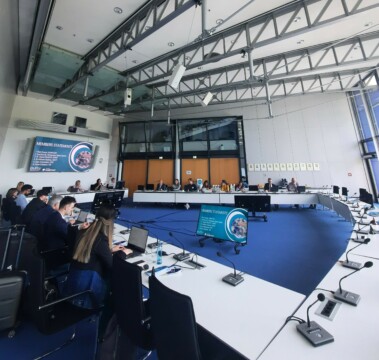
Vincent Garbaglio, International Relations Officer at EUMETSAT, stressed the Organisation’s focus on the end-users, highlighting the crucial data access EUMETSAT provides to its user community showcasing all operational platforms for data sharing available from their portals.
EUMETCast was highlighted as a fundamental tool, representing EUMETSAT’s primary dissemination mechanism for the near real-time delivery of satellite data and products. Being a significant tool for the user community, it holds a particular importance in Africa, as Mr. Garbaglio explained, where it allows users to access data via satellite communication using a simple antenna.
Throughout the day, EUMETSAT’s involvement in the continent was thoroughly examined, as one of the key objectives of the Organization in its strategic agenda for 2030.
EUMETSAT’s strategy in Africa focuses mainly on building local capacity, improving access to satellite data, and fostering partnerships to support sustainable development and climate resilience. Key activities include training African professionals, enhancing data infrastructure, and collaborating with several key regional organizations, like the African Centre of Meteorological Applications for Development (ACMAD) and the Moroccan Directorate of National Meteorology (DMN).
Fuelling the discussion about the growth of the African space sector and the establishment of new collaborative endeavour within the African continent, Ahmed El Fadhel, President of the Tunisian Space Association (TUNSA), took the stage during the event.
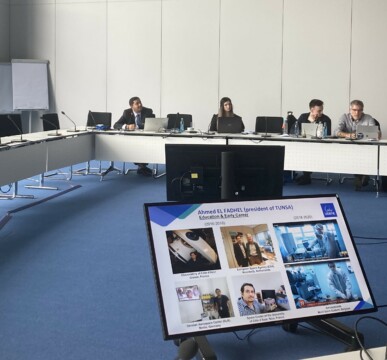
As Eurisy partner in the new UDENE project, he introduced the Tunisian Space Association (TUNSA), its key priorities, and strategies, highlighting the multidisciplinary profiles of its members (from experts in medicine, agronomy, data science, and engineering) showcasing the ambition of the Association to approach space from diverse perspectives to support the holistic development of the space sector in Tunisia and Africa.
UDENE focuses on three hypotheses and geographic areas: Türkiye, Serbia, and Tunisia, and Mr. El Fadhel presented the Tunisian use case, which explores the impact of a connected park system on reducing heat load in the city of Tunis.
Mr El Fadhel also shared the ambition to outline a more focused programme to facilitate exchanges between SMEs and space actors across the Mediterranean region, supporting strategic collaboration, discussing ongoing negotiations with various entities to establish a “Mediterranean Space Bridge.”
Key discussions about this initiative involve, to mention some, the Tunisian Minister of Foreign Affairs, the Italian Embassy in Tunisia, and the Italian company D-Orbit. Initially focusing on Italy and Tunisia, this initiative plans to expand to other African countries and resonates with a growing desire to support the growth and expansion of the African Space sector.
Although still in draft form and subject to ongoing discussions, it will be very interesting to see this new cooperative effort bloom in the near future, to support a unified space strategy on the continent.
The strategic topic of international cooperation with Africa was also accompanied by the second key topic Eurisy is currently placing under the spotlight.
Eurisy has been pivotal in investigating the mismatch between the skills required in the downstream space sector and existing educational gaps. Over the past years, its interest and involvement in this area has expanded, leading to the current involvement in the Space4GEO large scale partnership, and to the participation in two projects focused on education and training, GEO-Academy and SpaceSUITE.
During the panel on Skills, Maria Vittoria D’Inzeo from DG DEFIS of the European Commission provided an overview of the Commission’s focus on space-related skills and competencies. She outlined the major initiatives undertaken by the European Commission in recent years, highlighting the current efforts in training and skills development within the space sector. Notably, she mentioned the EU Space Academy Learning Platform, a free online training resource accessible to all individuals, students, young professionals, and start-ups interested in the space application business.
You can access the full presentation here: European Commission-Skills in the Space Sector
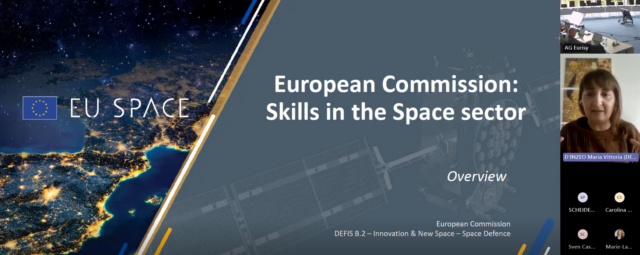
You can access and explore the platform here: https://www.euspa.europa.eu/spaceacademy/
Gabriella Povero from LINKS Italy and Sven Casteleyn from the University Jaume I in Spain provided an overview of the ongoing activities within the SpaceSUITE project.
Aimed at bridging the gap between the supply and demand of skills in the downstream space sector, the project objective will be identifying skills gaps and mismatches, and subsequently designing and delivering new curricula and training programmes for students.
Gabriella Povero introduced the framework used to gather and map space-related skills in educational offerings and professional demand within the downstream sector. The design of the methodology of this approach will be developed during this year and will mostly consist of data collection focusing mainly on the topics of Satellite Navigation Positioning and Timing and Satellite Communication, and from next year also on Earth Observation.
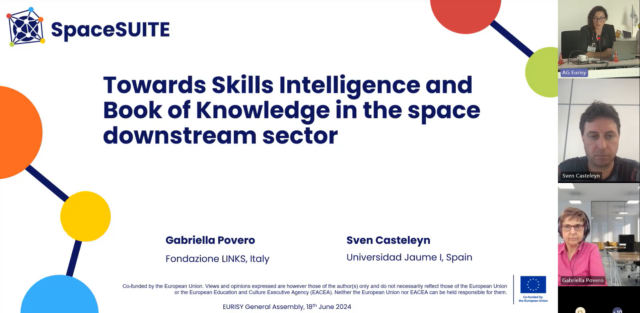
Sven Casteleyn, on the other hand, elaborated on the concept of a Body of Knowledge (BoK), detailing how the current Earth Observation- and Geo Information-oriented BoK will be expanded to include the space downstream sector within the SpaceSUITE project, serving as a shared vocabulary in a suite of tools aimed at bridging the skills gap.
The panel on Skills also showcased the GEO-Academy project. Angelos Lazoudis from the educational insitution Ellinogermaniki Agogi (EA) introduced GEOBSERVE, a virtual space for teachers to exchange best practices, access new materials, and distribute lessons through GEO-Academy Hubs. GEOBSERVE aims to support teacher training events and initiate peer-to-peer training, thereby ensuring the sustainability of the GEO-Academy project. The platform’s goals include collecting learning materials and fostering a peer-to-peer community for the exchange of good practices. The platform is now online, and you can access it here: https://portal.geoacademy.eu/
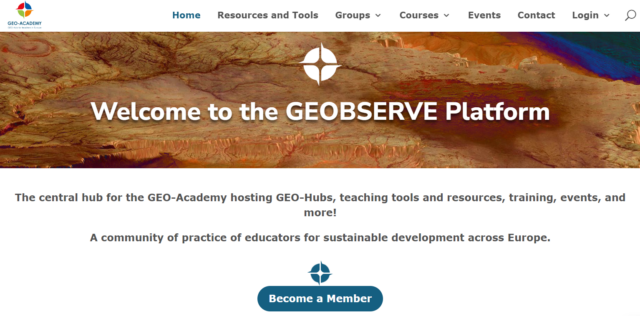
The dynamic discussions and shared insights promise exciting developments and collaborative efforts within Eurisy, inspiring new initiatives and potential partnership which will undoubtedly foster dialogue and cooperation within the Community and beyond.
